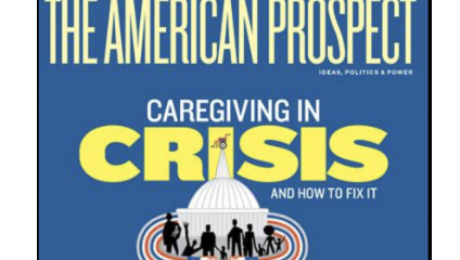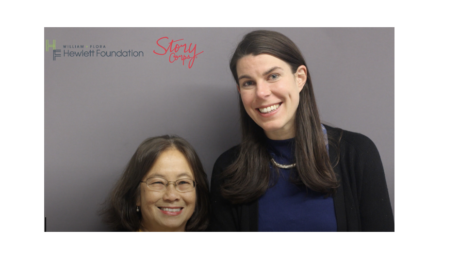Caregiving in Crisis and How to Fix It: Special Issue from The American Prospect
Last month, the Prospect released a special issue featuring a series of articles surrounding family care,“Caregiving in Crisis and How to Fix It.”
To accompany this issue, a special event was hosted by the Prospect in which various activists, writers and caregivers discussed family care, child care, elderly care, paid family leave to provide care, and long term support for caregiving services.
This event featured:
David Dayen, executive producer for the Prospect
Ai-jen Poo, co-director of Caring Across Generations,
Lynnea Redmon-Williams, a caregiver working fulltime
Tasmiha Khan, Prospect contributing writer
Rhacel Salazar Parreñas, Professor of sociology at the University of Southern California
Brittany Gibson, Prospect writing fellow
See the video below for the entire discussion:
This blog was authored by Jenn Brown, CWE-GAM Communications Assistant
- Published in Child Care, elderly care, Long Term Care Sector, Special Issues
Global Nonprofit Leaders on Why Women’s Time and Work Must be Part of Future Policy Choices
Last year, before the outbreak of COVID-19, the Hewlett Foundation teamed up with StoryCorps to record conversations with six nonprofit leaders working from Nairobi to Mexico City to make women’s lives, including paid and unpaid work, visible and part of economic policy decisions. Their professional endeavors—and personal motivations—help us see the different ways women experience day-to-day life, and are affected by social and economic changes, including the COVID-19 pandemic and prevention measures.
Maria Floro grew up in the Philippines and saw her parents treat her and her brother very differently. She was expected to help in the household work, including cleaning her brother’s room—something that nagged at her even when she was only four or five years old. Jenna Harvey watched her mother take on the majority of care work in her home and for her grandparents. It made her curious about gender and the unpaid work women do to make the world run.
Today, Floro is an economics professor at American University and runs Care Work and the Economy, a network of researchers interested in incorporating care work and gender into macroeconomic and social policies. Harvey is the global Focal Cities coordinator for Women in Informal Employment: Globalizing & Organizing (WIEGO). As a global network—with Accra, Dakar, Delhi, Lima, and Mexico City as focal cities—WIEGO helps street vendors, waste pickers, domestic workers, and other informal workers organize themselves and use research and analysis to urge local, national, and global policymakers to improve their working conditions and opportunities.
Memory Kachambwa’s first fight was with a boy on a bus outside her farming town near Harare, Zimbabwe. “Who appointed you to be captain of the bus?” she remembers telling him when he tried to take charge and told her to sit quiet. Today she runs the African Women’s Development and Communication Network (FEMNET) based in Nairobi. FEMNET’s 800 members in 46 African countries work to create an African society where women and girls live with dignity and equal rights.
In her StoryCorps conversation, Kachambwa speaks with Gretchen Donehower, who leads the Counting Women’s Work project at the University of California at Berkeley. As a teenager, Donehower told her mom she wanted to be the first female chair of the U.S. Federal Reserve Board. She now runs a global research project that has teams in 60 countries tracking how men, women, girls, and boys produce, consume, transfer, and save economic resources—including with a new tool developed to track this during the coronavirus.
Kachambwa and Donehower recall another health crisis that put a large extra unpaid care burden on women in sub-Saharan Africa: HIV/AIDS. Women, including grandmothers, were often the ones who cared for the sick and for orphaned children. Policymakers, they say, need to include the cost of women’s time caretaking to figure out how and where to allocate resources to respond to health and economic crises. The care economy, Kachambwa and Donehower agree, is part of the economy.
This blog was authored by Sarah Jane Straats from the Hewlett Foundation.
Original blog published by Hewlett Foundation on October 19, 2020. See here for the original posting.
Reposted with permission from Sarah Jane Straats.
- Published in Leaders in Non-profit, Special Issues


